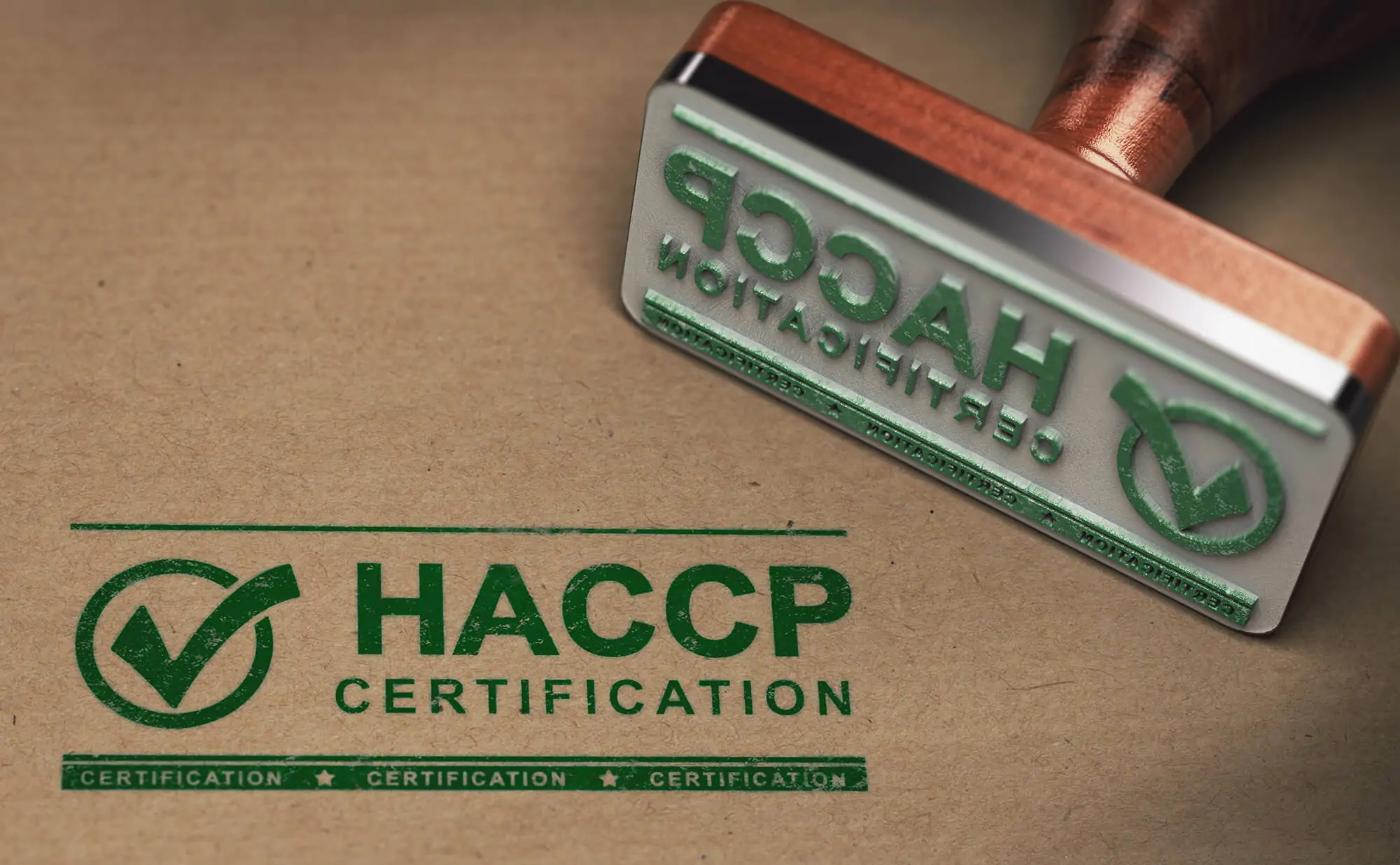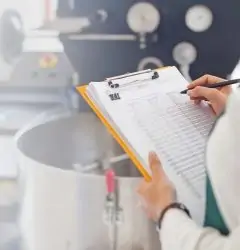20 Jul

Introduction to the HACCP
Running a food and drink business requires a vigilant check on the quality control of your products during each process, including the manufacturing, processing, or handling of the food. You have to ensure that the edibles are fit and safe for human consumption.
A thorough check of the processes decreases the chances of any foodborne illnesses, which may require hospitalization in some cases, and may even prove to be fatal, in a few cases. Food poisoning is a serious issue related to the food and drink sector and can be controlled by the implementation of proper food safety SOPs. One such internationally recognized system is the HACCP (Hazard Analysis and Critical Control Point).
This post discusses why is the HACCP important and its benefits for your food and drink business.
What does HACCP stand for and what does it do?
The Hazard Analysis and Critical Control Point (HACCP), a part of the FDA (FOOD and Drug Administration), is an internationally recognized system for the prevention of any safety hazards in food. It is an effective system for controlling food safety at every step of production, starting from the ingredients, down to the distribution of the food to the consumers.
With the HACCP, you can practice improved food safety management protocols, in addition to the implementation of other quality management systems. The main purpose of the HACCP is to help identify any hazards that may occur during the food production process, which in turn, can affect the food quality. These potential hazards are identified and certain guidelines are set by the HACCP which must be implemented to prevent these hazards from occurring, ensuring food safety from the harvest to consumption.
By the strict and vigilant control of the production process, the chances of any biological, chemical, or physical hazards associated with food are reduced significantly.
The History of HACCP
During the 1960s, the National Aeronautics and Space Administration (NASA), the Pillsbury Company, and the U.S Army Laboratories collaborated to provide safe food for the astronauts going on a space expedition. That was when the HACCP came into existence. The Critical Control Points (CCP) of NASA’s engineering management requirements were used as a guideline for this food safety protocol. Then, contractors were hired by NASA and Pillsbury to help eliminate any critical failure areas identified in the food processing procedures.
The implementation of these guidelines was seen as a success story and these guidelines were used by an infant food company. An infant cereal, Farina, had an episode of food contamination with glass pieces. A microbiologist at Pillsbury, Howard Baumann, had advocated for this company to adopt the HACCP guidelines. He also had an important role to play in setting up the HACCP guidelines.
During the National Conference on Food Protection, held in 1971, the Food and Drug Administration (FDA) concluded that Pillsbury would conduct a training program, for the FDA inspectors, to help train them in the inspection of canned food. The first session was held in September 1972 for 21 days. This was the first time when the HACCP management system was used to educate other food facilities in the industry. Today, HACCP compliance is deemed necessary for every food facility.
Major Food Hazards
Food hazards can be associated with chemical, physical or microbiological contaminants. The most significant food hazard affecting the food industry is the microbiological contamination by Salmonella, E. coli O157: H7, Listeria, Campylobacter, and Clostridium Botulinum. In addition to these, chemical contamination by the residue of pesticides, insecticides, and antibiotics is also an issue faced in the food industry.
To combat these issues, microbiological testing has been introduced. However, end-product testing is not effective in solving this issue, because it only indicates the presence of bacteria and does not help in identifying or eliminating the contamination. Hence, by tracking microbiological data, it can be identified which production process is not being controlled properly. Rectifying these issues will reduce bacterial levels during production. Microbiological testing plays an important role in verifying the effectiveness of the HACCP system.
7 Principles to Ensure Good Food Quality Standards
These seven principles, if implemented, would prove to be a sign of good practice for your food factory. These principles are the standard codified practice of the HACCP to date. Any health hazards associated with the food production processes, from raw materials to the consumption, are eliminated. These principles are:
1. Identify all potential hazards
First and foremost, you should identify all the potential hazards that could be associated with your food production processes. Once the hazards are identified, the next step is to think about how you could combat these issues.
2. Identify the Critical Control Points (CCP)
To prevent or eliminate a food safety hazard, the CCPs come in handy. These are points at which various controls can be applied to ensure better food safety. Monitoring the CCPs is vital for the effectiveness of the HACCP program.
3. Establish Critical Limits (CL)
The CL must be controlled at the CCP to help prevent, eliminate, or reduce the chances of a food safety hazard from occurring. The CL is a maximum or minimum measurement value, such as time, temperature, or pH that must be controlled at the CCP.
4. Monitor all the Critical Control Points (CCP) vigilantly
You must monitor all the CCPs and maintain a regularly updated record to verify that all the CLs are met. Details of the CL measurements must be outlined, including how the measurements were taken, by whom, when, and how frequently were they taken.
5. Appropriate Corrective Action
While running a business, certain unforeseen circumstances can occur. You have to be prepared with a proper plan of action and ensure that it is followed.
6. Test the HACCP Plan
The HACCP plan must be verified to make sure that it is working according to the plan outlined above.
7. Maintaining a record
These records help to prove that the food produced is safe for human consumption. If the need arises, you may require to present these records to prove that the food produced is produced by following the HACCP standards.
The Benefits of HACCP in Food Safety Management
Since the HACCP is enforced by the FDA, all food facilities must follow and abide by the rules of the HACCP. The approval of the FDA is a must for selling of products in the markets of the United States. Furthermore, the FDA is a federation that is recognized worldwide. Implementation of the HACCP certificate would have numerous benefits for your business. The HACCP benefits include:
Fulfill your legal obligations
To be able to sell in the markets of the United States, you must be compliant with the food safety acts, amendments, and laws implemented by the FDA and FSIS- the two main food safety agencies in the United States. If you do not abide by these laws, your products will not be certified by the FDA and you will not be allowed to sell in the market.
Protect your bottom line
Not implementing proper food safety management programs can lead to heavy fines imposed by the government, since there would be a violation of the laws, which is a big offense. Either heavy fines are imposed by the government or your production license is canceled altogether. Even customers can take legal action against you, which can lead to costly settlements, in addition to tarnishing your brand’s name in the market. With the HACCP benefits, you can avoid these additional costs and focus on your products.
Attract more customers
With better quality food being produced, due to the implementation of the HACCP, you can attract more customers towards your brand. Since your customers would be having a pleasant and hygienic experience, they would not be leaving any negative reviews for your products on various platforms.
This builds a strong reputation for your brand and it attracts more customers. Since the FDA is recognized worldwide, your products will be available for export to other countries, promoting international trade. This would help to increase consumer confidence in food safety.
Better quality of your food products
One of the main HACCP benefits is that the quality of the food produced is elevated than the quality of food produced without following any HACCP outline. Better quality products mean more customers would be happy, which in turn, means more profit for you.
Improved efficiency
Your employees should work effectively to help maximize the output and provide the results you want. With HACCP, you can reduce downtime, as it provides a proper framework for your team to help make your business a success. This also ensures consistency in the production of your products and a reduction in product loss during processing.
Provide evidence of due diligence
If a customer becomes sick after consuming your products, and if you are accused of poor food safety standards, you can provide all the evidence of how you have performed your due diligence. HACCP provides enough evidence to save you from any legal issues or defamations attributed to your brand.
Boost employee morale
The HACCP ensures that the surroundings, where the products are being manufactured, are safe. This could help to boost your employee’s morale as they would be working in a clean environment, where all food safety protocols are followed. This could help to motivate your employees to stay focused on their work and perform better.
To sum it all up, the HACCP helps to improve food safety management. The HACCP benefits include the following:
- Helps to save money in the long run
- Provides safe food for your consumers
- Better food safety standards
- Ensures all the procedures comply with the food safety laws
- Better teamwork and efficiency
- Due diligence in the court
HACCP Certification
With the HACCP certification, it is verified that your business complies with all the HACCP standards and guidelines. This certificate is granted by an external certification authority that has all the required skills and knowledge to assess your facility. These third-party authorities must have the necessary qualifications required to provide the certification. Therefore, you should check the credentials of the food safety auditors.
HACCP certification is necessary for some countries. Without this certificate, your products cannot be sold in the market. Thus, it is an important tool for the success and viability of your food business.
To gain your certificate, you would be required to undergo an audit and assessment for food safety and the HACCP standards and guidelines. This would be conducted by a reputable and competent food safety auditor.
This process usually involves an on-site inspection and review of the company’s documents and records. The duration required for this audit depends upon your company’s size; usually, it can take anywhere between one to five days.
The HACCP certification cost depends on the size and location of your facility. Third-party certification budget includes the internal and external audit costs, cost of development and implementation, cost of maintaining the HACCP system, and training the staff for HACCP. This certificate is valid for three years only and must be renewed timely.
Benefits of Using CMMS for the HACCP Compliance
The Computerized Maintenance Management Software (CMMS) is becoming an increasingly popular choice with the managers of the food and drink industries. In this digital age era, it would be seen as the best option to utilize the facility of CMMS for the compliance of the HACCP standards.
The CMMS allows managers to reduce their workload and the can easily streamline processes and improve maintenance operations for the brand. The benefits of using the CMMS for the compliance of the HACCP standards are:
Improved Maintenance Operations
Instead of switching between multiple spreadsheets, it is time for you to switch to a CMMS software. By doing so, you can easily automate tasks, get detailed analysis and reports for the food production operations, view real-time data, and have everything in one place.
You can use this software from any web-based device, including mobiles. Moreover, work orders, work requests, and the inventory can also be managed with the CMMS software. This helps to improve the efficiency of the brand.
Comply with Food Safety Regulations
With CMMS, you can save all the required documents, such as safety manuals, records associated with equipment, and standard operating procedures. With just a few clicks, you can easily retrieve all your data to show the HACCP compliance, when the need arises.
Reduced Product Wastage
Since you would be complying with all the HACCP standards, and it would be easier to keep a track of the compliance, there would be a significant reduction in the wastage of food during production. Real-time access to all the information and the inventory would prevent the staff from over-ordering any ingredients. You would save up on money too, by preventing food wastage.
Better Asset Management
With a comprehensive history for each asset, the average lifespan of the assets can be increased. This is possible due to the regular preventive maintenance performed. The funds saved from here can be used in other areas.
Better Equipment Reliability
With CMMS, you can effectively plan, schedule, and record all data related to the preventive maintenance activities for the equipment. With proper and timely maintenance, the average lifespan of your equipment is increased.
There are many CMMS software available for you to choose from. It all depends upon your budget and requirements. There is something for every food manufacturing facility that fulfills all their requirements. One such cloud-based CMMS software is EcoDocs, powered by Folio3.
It is reliable software to help simplify all your maintenance management challenges. From your work order management to the asset and maintenance of your equipment, EcoDocs simplifies it all for you, making your workers agile and more productive. Collect and analyze data in real-time, perform automated tasks, and manage all maintenance procedures with greater efficiency with EcoDocs. For the food industry, EcoDocs will help you in the compliance of the HACCP standards and protocols.




Ecodocs